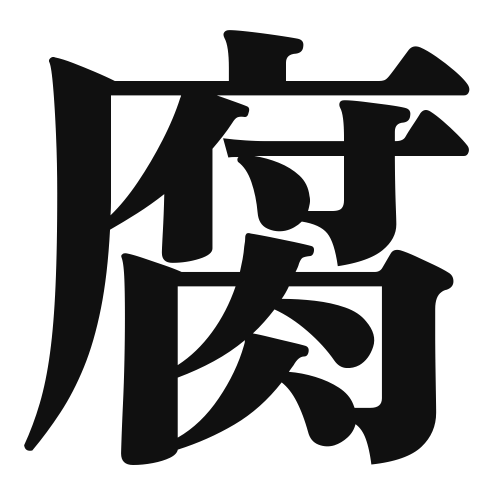1. Overview of Meaning
The kanji “腐” (fu) primarily means “to rot” or “to decay.” It is often used to describe the process of decomposition in organic matter, but it can also refer to something that has become corrupt or morally degraded.
2. Formation and Radical
Formation of the Kanji: The kanji “腐” is a phonetic-ideographic character (形声文字). It combines the radical for “meat” (肉) on the left, indicating a connection to organic matter, with the phonetic component “fu” on the right, which suggests its pronunciation.
Radical: The radical of “腐” is 肉 (niku), which relates to flesh or meat, emphasizing its association with decay and rot.
3. Examples of Usage
Common Words and Phrases: Some frequently used words that include “腐” are:
- 腐敗 (ふはい, fuhai) – corruption
- 腐食 (ふしょく, fushoku) – corrosion
- 腐った (くさった, kusatta) – rotten
Example Sentences in Daily Conversation:
- この果物は腐ってしまった。 (Kono kudamono wa kusatte shimatta.) – This fruit has rotted.
- 彼の行動は腐敗している。 (Kare no koudou wa fuhai shite iru.) – His actions are corrupt.
4. Synonyms and Antonyms
Similar Kanji: A similar kanji is “朽” (きゅう, kyuu), which also means “to decay” but is often used in a more literary or poetic context.
Antonyms: An antonym of “腐” is “新鮮” (しんせん, shinsen), meaning “fresh,” which indicates something that is new and not decayed.
5. Cultural and Historical Background
Relation to Japanese Culture: In Japanese culture, the concept of decay is often linked to the impermanence of life, a theme prevalent in traditional arts and literature. The idea of “mono no aware” (物の哀れ) reflects an appreciation for the beauty in the transient nature of things, including decay.
Proverbs and Idioms: One common saying is “腐っても鯛” (くさってもたい, kusatte mo tai), which translates to “Even if it is rotten, it is still a sea bream.” This idiom suggests that even something that has lost its value still retains some worth or dignity.
